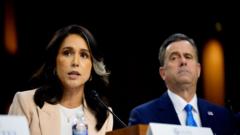Amid accusations of incompetence, President Trump and intelligence leaders refute claims of classified information leaks, amidst rising scrutiny over potential breaches in national security protocols related to a Signal chat.
US Officials Insist National Security Not Compromised Despite Signal Chat Leak

US Officials Insist National Security Not Compromised Despite Signal Chat Leak
President Trump and his intelligence heads dismiss significant concerns surrounding the inadvertent addition of a journalist to a Signal group chat discussing airstrikes in Yemen.
US President Donald Trump, along with his intelligence leaders, have downplayed the gravity of a recent breach involving a Signal group chat that mistakenly included a journalist during discussions about military airstrikes in Yemen. The group chat, which included key figures such as Director of National Intelligence Tulsi Gabbard and CIA Director John Ratcliffe, became a subject of controversy after it was revealed that the journalist, Jeffrey Goldberg, reported observing sensitive discussions that outlined operational plans.
During a Senate hearing, both Gabbard and Ratcliffe emphatically asserted that no classified information was exchanged within the chat, while Defence Secretary Pete Hegseth faced sharp criticism however did not testify during the session. The fallout from the incident, dubbed "Signalgate," has drawn bipartisan concerns, with Democrats labeling the chat a major security blunder, marking the handling of sensitive information as "sloppy" and "unprofessional."
The leak occurred when Goldberg was inadvertently added to the 18-member group, initially thinking it was a hoax until the airstrike was subsequently carried out. The March 15 strikes reportedly claimed 53 lives and were aimed at Iran-affiliated Houthi militants posing threats to maritime trade.
Senate Democrats, while pushing for accountability, demanded stronger management of classified discussions, pointing to significant lapses in communication protocols. Meanwhile, Trump supported his team and characterized the leak as a minor hiccup created by a staff error—the journalist was added during a "glitch," he suggested, with no effect on operations.
Trump expressed confidence in National Security Adviser Waltz, who, while admitting responsibility, criticized Goldberg for allegedly seeking sensational stories rather than reporting successes from the administration. Despite Ratcliffe and Gabbard’s assertions that no operational details were shared, various security experts deemed the use of a civilian messaging platform for critical discussions as an unacceptable risk.
The advocacy group American Oversight has since filed lawsuits against involved officials, claiming violations of federal record-keeping laws stemming from the chat's auto-delete feature. Signal, too, has faced scrutiny with experts stressing the need for secure communications in national security contexts—pointing out that the inadvertent leak could provide adversaries with invaluable insights into U.S. military operations. Despite assurances from Signal about the security of their platform, national security observers argue that this episode serves as a stark reminder of the importance of adhering to strict communication protocols.



















